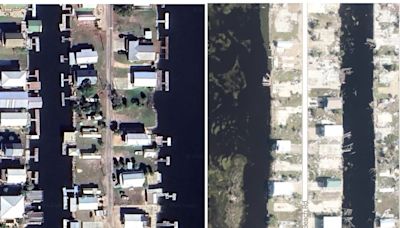Search results
Oct 28, 2018 · If we used the verb "to storm" we could use "it" the same way: It's going to storm. It is storming in Connecticut. But the verb "to storm" is less common. It is more common to use the noun, like you did in post #1. With the noun, we use "there is". There's going to be a storm. There was a terrible storm last night.
Nov 15, 2018 · Nov 15, 2018. #2. I feel they have slightly different uses. 'Break out' simply means "begin". The weather was fine, then it changed, and a storm began / started / broke out. A storm 'breaks' when you have been watching the rainclouds, knowing that the storm is about to begin; the point at which that finally happens is when the storm breaks.
Feb 11, 2014 · American English. Feb 12, 2014. #3. I have to say that I wouldn't use "blow down" or "blow over" in this case. A) The strong wind blew off the roof of the house. B) The strong wind blew the roof off (of)* the house. For what it's worth, I might use the word order in B). *"of" can be omitted.
Oct 9, 2022 · Oct 9, 2022. #1. Can I use "it" instead of "there" to say that "it was a storm" and not something else? For context, a friend says that he heard something last night. And I say it was a storm. 1."There was a storm yesterday." 2.It was a storm yesterday.
Dec 26, 2016 · Massachusetts, U.S. English - U.S. Dec 26, 2016. #6. Now that AE speakers are awake ... I don't like "heavy" applied to a storm. Like Rover_KE above, I'd also say "a severe/violent/powerful storm," or perhaps "a strong storm" as a step down from those. I would apply the adjective "heavy" to something that might come down in a storm: a heavy ...
Jun 26, 2009 · 1) to storm off. 2) in a huff. The two do not have to be used together. I don't know why Wanda is angry. She just burst in, shouted something at me about her car, and then stormed off. When I told the customer that the dress she wants is not made in a size large enough to fit her, she left in a huff. N.
Aug 27, 2021 · Sapere_Aude said: ***Overhead, the baleful clouds were announcing a storm's approach. 1. Overhead, the baleful clouds were announcing [that] a storm [is] approach. 2. Overhead, the baleful clouds were announcing a storm's approach. (Apostrophe) Are you asking whether the red 's is: - a contraction of "is", as in your sentence 1.
Nov 12, 2009 · Nov 12, 2009. #2. Well, "to storm" means "a direct and violent assault on a stronghold." So if the yogurt were under lock-and-key, perhaps. We use through in a variety of ways: to work through one's problems, for example. In this case, I think the "storm" gives you a sense of the fast, furious action, and "through" has a sense of progression to ...
Dec 26, 2005 · Mexico Spanish/English. Dec 26, 2005. #3. We do have something in spanish "una tormenta en un vaso de agua". The meaning is that, for instance, somebody is exagerating and is making a big fuss of a small problem we would say, for instance: "Estás haciendo una tormenta en un vaso de agua.”. (You are making a storm in a tea cup).
Jan 30, 2018 · Feb 1, 2018. #17. Dujina said: Could anyone please explain to me which one is correct: 1) There is going to be a storm tonight. 2) It is going to be a storm tonight. My Macmillan book says the right answer is "there", but I don't understand why both are not possible. This has to do with deixis and anaphora.






